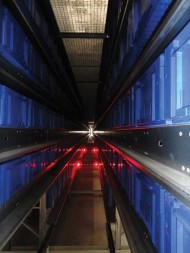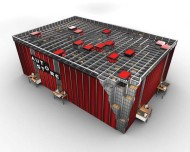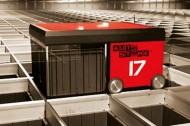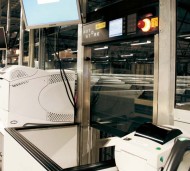 Swisslog is a global provider of integrated logistics solutions, with a comprehensive offering running from the supply of high performance material handling equipment to complement existing applications, through to designing and implementing large scale, turnkey projects incorporating these items in complex warehouses and DC’s.
Swisslog is a global provider of integrated logistics solutions, with a comprehensive offering running from the supply of high performance material handling equipment to complement existing applications, through to designing and implementing large scale, turnkey projects incorporating these items in complex warehouses and DC’s.
Both Swisslog’s standard products and its major projects serve the same purpose: to increase customers’ flexibility, responsiveness and quality of service at a stroke, while minimising logistics costs. Swisslog offers customers of all sizes a complete one-stop service, working in partnership with them to address their developing materials handling needs.
Swisslog’s product portfolio encompasses tote and palletised products, backed up by a broad range of services taking in consultation, design, implementation, and customer support. At product level Swisslog has recently strengthened its range of materials handling solutions with the addition of SmartCarrier and AutoStore, two major innovations in tote-based materials handling, which mean Swisslog now offers customers the widest light goods technology portfolio in the industry.
James Sharples, Swisslog’s newly appointed Head of UK Sales, spoke to Warehouse & Logistics News.
Warehouse & Logistics News – James, you’ve recently been appointed Head of UK Sales. Where were you before?
I’ve worked for Swisslog since 1998, and held various positions including Head of the Design Team. As Head of Sales and Consulting I lead all local sales, consulting and marketing activities for the UK, and I am dedicated to developing existing and new market opportunities. Whilst no two days are the same, on a day-to-day basis, my role tends to involve overseeing our sales projects to ensure the best solutions are applied at each customer’s application. Before Swisslog I worked for a soft drinks producer on a new factory build, including implementing an automated warehouse with one of our competitors.
WLN – How important is the consultancy side of your business?
The consultancy side of our business is crucial to our success in ensuring the best solution for every customer. We aim to create cost savings for customers through selecting the most appropriate material handling solution for their needs, and this is predominantly ensured through the work of our consulting and design experts.
WLN – Do you offer ‘pure’ consultancy for people who already have automated conveyor systems and so on?
Yes; Swisslog’s consulting and design experts work on both existing and new sites. We often identify potential cost savings for existing sites, and either design new solutions or recommend improvements to existing solutions with this in mind.
WLN – Where does Swisslog stand in the global rankings as a supplier of this equipment?
Modern’s 14th annual survey of leading materials handling systems suppliers from around the world has ranked Swisslog in sixth position for the last two years.
WLN – Where is Swisslog’s global head office? Which countries do you have operations in?
Swisslog has a global presence, with over 2,000 staff in 20 countries worldwide, providing the expertise that customers in more than 50 countries around the world rely on. The global head office is based in Buchs, Switzerland. Here, Swisslog’s offices are combined with a ‘TechLab’ facility, where customers can see Swisslog’s technologies in action!
WLN – Where is your UK office? How important is Britain to Swisslog’s global business?
The UK operation, headquartered in Redditch, is one of Swisslog’s major market segments, with a strong portfolio of installed solutions and a growing reputation as a reliable and innovative player.
WLN – You’ve recently launched two innovative solutions for light goods handling, SmartCarrier and AutoStore. What does SmartCarrier do?
SmartCarrier is designed specifically for highly dynamic light goods warehouses. Its transport robots are autonomous vehicles with their own on-board intelligence, which can not only manage tote storage and retrieval in stores with a very high throughput rate, but also transport stock around the warehouse or production line, deliver totes and trays directly to dynamic picking stations, and be used for both order picking and case picking. SmartCarrier offers an excellent cost/throughput ratio, has low maintenance and running costs and, because of its modular design, offers immediate and flexible scalability.
WLN – Where do the carrier vehicles take their orders from?
Swisslog’s WarehouseManager™ software creates transport tasks using information from the company’s ERP system. These tasks are transmitted to the carrier vehicles via SmartCarrier’s own controls system.
WLN – What do SmartCarrier vehicles do in response to orders?
When the SmartCarrier receives an order, it processes it autonomously. Without using a route plan but with knowledge of its location and that of other vehicles, it orientates itself independently and always finds the quickest path to its destination. The SmartCarrier’s local intelligence links together all areas and all other vehicles without any interfaces.
WLN – If there is more than one SmartCarrier vehicle working, how do orders get shared out?
SmartCarrier’s software delegates tasks to the most appropriate carrier dependent upon a range of factors such as the location of the carriers in relation to the required goods, and the other tasks which need to be executed.
WLN – Can SmartCarrier units be moved around and deployed in different parts of the warehouse?
Yes, they can: thanks to their low weight, they can be easily transferred between levels in the warehouse. This ensures they are efficiently used in multi-tiered storage facilities, or several can be deployed on one level if throughput demands.
WLN – What happens when individual SmartCarrier vehicles fail?
SmartCarrier is based upon a modular concept that enables system performance to be met by varying the number of vehicles in operation. It can be easily modified for each application’s particular requirements. If one vehicle fails, the others can continue to perform their work independently of the problem and find different routes. This increases availability, maintaining time to complete orders. If a vehicle needs maintenance, its low weight of approximately 15kg allows it to be removed by a single person, without tools or lifting devices.
WLN – What kinds of work rates and performance do the SmartCarriers achieve? How do they compare with the output of other machines?
SmartCarrier is ideal for solutions where a high throughput is required. Its throughput of up to 500 totes infeed/outfeed per hour compares to the capability of around 150 totes for a typical miniload crane. If comparing to other similar solutions available in the market, it is definitely SmartCarrier’s flexibility which sets itself apart – the carriers’ ability to move from level to level means they are not restricted and can each move to where they are required most, thus allowing transport tasks to be executed in the quickest possible time.
WLN – How does SmartCarrier fit into your overall offering?
SmartCarrier supplements the Swisslog portfolio perfectly. Modern distribution centres frequently have a combination of different warehouse and transport technologies, with highly dynamic light goods warehouses being key to success.
WLN – What’s new about SmartCarrier?
Due to its flexibility, SmartCarrier opens up entirely new opportunities for innovative solutions that go beyond the storage application itself. Integrated dynamic picking zones are available already: the potential to use these autonomous carriers to link up additional areas within an overall system is enormous.
WLN – What effect does self-managed material flow have on warehousing operations?
Self-managed material flow has many advantages over conventional approaches to control. In the highly dynamic light goods warehousing environment, ’self-managed’ helps to simplify processes, reduce complexity and dramatically increase availability. In some markets, the classic one of course being Internet retailing fulfilment, customer orders are becoming ever more fragmented, consisting of fewer order lines in smaller quantities, whilst total order numbers are increasing. This means items need to be presented far more often for picking, and throughput often doubling with little increase in fulfilment. In manual pick systems, this leads to reduced productivity and more frequent labour-intensive restocking, resulting in more material flow for restocking, in turn depleting customer order capacity. Swisslog’s innovative SmartCarrier transport and storage system for totes is designed for such highly dynamic stock management applications.
WLN – What does a typical SmartCarrier system comprise?
It consists of three components; a racking system, a high-speed double lift, and various autonomous robotic vehicles called Carriers. The racking system consists of simple shelving and storage locations, integrated into the vehicle transportation track. The system can manage entirely without any external power supply system since the Carriers are equipped with the latest maintenance free energy storage facilities on board. The high-speed double lift has a lift carriage that can accommodate two Carriers at a time. The hourly performance of each lift is up to 500 store inputs and retrievals.
WLN – Was SmartCarrier developed with a specific industry in mind?
SmartCarrier was originally conceived for use in production logistics, where it has been successfully used for seven years at various customer sites, including a major European car manufacturer. The experience and knowledge gained from this application are now being transferred into distribution logistics.
WLN – What kind and size of operations, in which industrial sectors, is SmartCarrier aimed at?
SmartCarrier’s possible applications for tote and bin storage and handling are virtually unlimited, whether it is used for fast and reliable picking, high-performance stock consolidation or on production lines. SmartCarrier can deliver product to manual picking stations, manual or automated palletisation stations, production lines or despatch docks, in sequence and just-in-time.
WLN – Presumably you can also use SmartCarrier to automate other operational areas?
Yes, you can. Diversifying product ranges and the need to fulfil orders rapidly means warehouses employing stocked items in bin storage are becoming more prevalent in retail, pharmaceutical, food and beverage industries. Because of its flexibility, the SmartCarrier warehousing and transport system opens up completely new possibilities for innovative solutions above and beyond classic warehousing applications. Apart from picking, SmartCarrier can also handle the transport of other items to key functional areas autonomously. You no longer need separate systems to handle occasional deliveries to laboratories, QA areas or even office areas. This releases enormous potential for using the autonomous vehicles to link together all functional areas of a facility. The hardest challenge will be when to stop!
WLN – What does AutoStore, your other new product, do?
AutoStore is an integrated system for storage and order picking of single parts and small cases, particularly suited to mail order businesses. It can be fitted easily into existing as well as new warehouses, and greatly increases effective space utilisation. Goods are stored in bins, which are stacked directly on top of each other and moved around by robots travelling on an aluminium grid above the totes. Each robot is equipped with a lifting device for picking up, carrying and delivering totes to ports manned by operators. These ports can be located on all sides of the grid or underneath it, if the grid is on numerous levels. Totes are delivered back-to-back, allowing the operator to carry out their picking tasks swiftly.
WLN – Are we talking about human operators, or are these also machines?
AutoStore is a goods-to-person application whereby bins are presented to a warehouse operator, who carries out the pick operation.
WLN – How des AutoStore use space more effectively?
AutoStore breaks new ground in its improved usage of valuable floor space, by eliminating the usual space associated with conventional crane storage. Space is a regular issue in designing material handling solutions and usually a costly constraint to overcome, but AutoStore is easily integrated into existing buildings and makes optimal use of the available area.
WLN – Again, what kinds of savings and other operational improvements does AutoStore offer? What size of operations is it suited to?
AutoStore is famous for its high speed and capacity; it can cope with a large range of throughputs, up to several thousand picks per hour if required, by adding or removing robots. But what really sets AutoStore apart is its flexibility; since the factors that influence tote movements are all changeable software options, the flow of goods can be modified easily. This flexibility also encompasses the height, length and width of the system, allowing it to be easily extended in line with expanding SKU range and business growth.
WLN – What orders have you had for AutoStore so far?
Competec, a Swiss IT trading group, has commissioned us to install an automatic small parts and container storage system starting in September 2011, at what will become Switzerland’s largest electronics distribution centre. The heart of this facility will be the AutoStore System. In the first stage of installation, the automatic container system will comprise 62,000 containers within 2,500 square metres. The containers will be stacked on top of one another in a self-supporting, modular aluminium grid. The grid will have 100,000 container locations, 25 ports for storing and issuing products, and 70 robots. Commissioning is scheduled for spring 2012. This is just one of a number of projects we have secured from both existing and new customers.
WLN – How green are SmartCarrier and AutoStore?
The SmartCarrier vehicles low weight makes them very energy efficient, and their excellent payload to tare weight ratio is more cost effective than more conventional solutions. SmartCarriers have energy recovery drives which, allied to intelligent energy management, results in a system with comparably low energy consumption. Maintenance costs are significantly lower due to reduced service components and the simplicity of access. Maintenance can be carried out without shutting down the system.
As a company Swisslog is committed to reducing energy usage and has developed the “GreenLog” concept, which supports consistent strategies employing weight optimisation, smart equipment usage and the use of energy-efficient drives throughout its product range. SmartCarrier is one example. “Greenlog” guarantees that the energy consumption of technology and products used in a solution has been optimally reduced. This includes not only the energy requirements of the individual systems and subsystems but also the plant as a whole, to enable the integrated system to deliver energy efficient operation. Unnecessary operations like housekeeping and load-free return travels are minimised, allowing the consumed energy to be used to deliver only the performance.
WLN – When were SmartCarrier and AutoStore launched?
We launched both technologies earlier this year at the LogiMat exhibition in Stuttgart, where they received an enthusiastic welcome from potential customers. AutoStore even walked away with the title of ‘Best Product of the Year’!
WLN – These technologies really need to be seen in action to be appreciated. Can they be viewed on line?
Yes, you can view our technologies online at www.youtube.com/swisslogwds.
WLN – What other solutions do you offer for the light goods environment?
We have an unrivalled portfolio addressing the light goods environment, which reflects our commitment to serve this sector; SmartCarrier and AutoStore complement our existing products, the QuickMove conveyor system and Tornado miniload cranes. The Tornado is the fastest and most energy-efficient miniload crane in its class, with a scalable modular system. The QuickMove conveyor technology consists of an integrated energy management system and is designed according to the plug & play principle.
WLN – What impact have the economic uncertainties of the last few years had on your business?
Swisslog has been fortunate to survive the recent turbulent market conditions relatively unscathed. This is predominantly thanks to our strong customer support business and the awarding of some large orders in new business over the past few years.
WLN – Finally where do you see Swisslog UK going from here?
The future for Swisslog looks bright, especially in the UK. Our wider portfolio of technologies and our unique products like AutoStore will enable us to compete even more and help us to develop our profile as a leading supplier of automated warehouse solutions.
Swisslog (UK) Ltd
Tel: 01527 55 1600









Comments are closed.